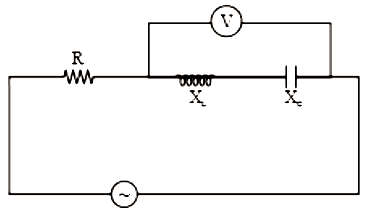An alternating current is given as \(i = i_1 \cos\omega t+i_2\sin\omega t\). The RMS current is given by;
1. \(\dfrac{i_1+i_2}{\sqrt{2}}\)
2. \(\dfrac{(i_1+i_2)^2}{\sqrt{2}}\)
3. \(\sqrt{\dfrac{i_1^2+i^2_2}{2}}\)
4. \(\dfrac{\sqrt{i_1^2+i^2_2}}{2}\)
1. \(\dfrac{i_1+i_2}{\sqrt{2}}\)
2. \(\dfrac{(i_1+i_2)^2}{\sqrt{2}}\)
3. \(\sqrt{\dfrac{i_1^2+i^2_2}{2}}\)
4. \(\dfrac{\sqrt{i_1^2+i^2_2}}{2}\)
In a step-up transformer, the turn ratio is 1:2. A Leclanche cell (e.m.f. 1.5V) is connected across the primary coil. The voltage developed in the secondary coil would be-
1. 3.0 V
2. 0.75 V
3. 1.5 V
4. Zero
A \(220~\text{V}, 50~\text{Hz}\) AC source is connected to an inductance of \(0.2~\text{H}\) and a resistance of \(20~\Omega\) in series. What is the current in the circuit:
1. \(10~\text{A}\)
2. \(5~\text{A}\)
3. \(33.3~\text{A}\)
4. \(3.33~\text{A}\)
The voltage reading on the voltmeter \(V\) in the circuit shown below will be:

| 1. | zero | 2. | \(100\) V |
| 3. | \(200\) V | 4. | \(300\) V |
The core of a transformer is laminated to reduce energy losses due to
1. Eddy currents
2. Hysteresis
3. Resistance in winding
4. None of these
An electric motor operating on a 60 V dc supply draws a current of 10 A. If the efficiency of the motor is 50%, the resistance of its winding is
1. 3Ω
2. 6Ω
3. 15Ω
4. 30Ω
A step-down transformer is connected to 2400 volts line and 80 amperes of current is found to flow in output load. The ratio of the turns in primary and secondary coil is 20 : 1. If transformer efficiency is 100%, then the current flowing in primary coil will be
1. 1600 A
2. 20 A
3. 4 A
4. 1.5 A
A loss free transformer has 500 turns on its primary winding and 2500 in secondary. The meters of the secondary indicate 200 volts at 8 amperes under these conditions. The voltage and current in the primary is
1. 100 V, 16 A
2. 40 V, 40 A
3. 160 V, 10 A
4. 80 V, 20 A
A transformer connected to 220 Volt line shows an output of 2 A at 11000 Volt. The efficiency is 100%. The current drawn from the line is:
1. 100 A
2. 200 A
3. 22 A
4. 11 A








